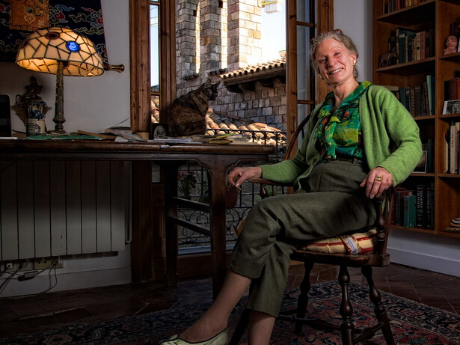Q & A: American Poetry
Q & A American Poetry: Karen Swenson

Are there essential ways in which you consider yourself an American poet?
Certainly in language I consider myself American. There is an American slang and colloquial expressiveness which it is important to incorporate into poetry, which is part of what makes it American poetry.
When you consider your own "tradition," do you think primarily of American poets?
No, I think of whatever poets writing in English that I know- Indian, Australian, Canadian, English.
Do you believe there is anything specifically American about past and contemporary American poetry? Is there American poetry in the sense that there is said to be American painting or American film? Do you wish to distinguish American poetry from British or other English language poetry?
Definitely. American English has its own rhythms and usages, distinct from other English speakers. I was recently in India where I met and spoke with a number of Indian poets. Their use of the language is neither American nor English.
Which historic poets do you consider most responsible for generating distinctly American poetics?
Walt Whitman, Emily Dickinson, Wallace Stevens, e.e. cummings, Elizabeth Bishop, Sylvia Plath.
What about the American poets who lived primarily in Europe (Eliot, Pound, Stein)? What about the European poets who have recently lived or worked in America (Heaney, Walcott, Milosz)?
They are a part of their own traditions but are as well a part of ours. English is the language of the world at this point in time and has more flavors than ice cream.
Are you more likely to read a contemporary non-American poet who writes in English or a contemporary non-American poet translated into English?
I am more likely to read a contemporary non-American poet writing in English but I can't defend that practice.
Do other aspects of your life (for instance, gender, sexual preference, ethnicity) figure more prominently than nationality in your self-identity as a poet?
Certainly gender is of great importance to me in my identity and it may, indeed, be of more importance than nationality.
Do you believe you could readily distinguish a poem by an American poet from a poem by other poets writing in English?
It might take more than one poem, but I do think I would be able to distinguish.
What do you see as the consequences of "political correctness" for American poetry?
It flattens it out. When I was a child there were lots of dialect poems which were read by ordinary, modestly educated people. These were not bigoted poems, just poems which noticed the differences in speech between immigrants. They were frequently funny because of the interaction portrayed between immigrant group. Political correctness takes the flavor out of things.
Published 1999.


